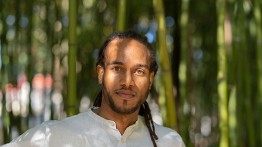Malcom Ferdinand | Facing the Colonial Toxicity of the World: the case of the French Caribbean
Saturday, April 10, 2021, 12 - 1:30pm

Photo by Bénédicte Roscot
Malcom Ferdinand delivers a free, public online lecture as part of the Spring 2021 Intra-Disciplinary Seminar series that addresses the double mechanism of colonial toxicities in the Plantationocene and the coloniality of toxics, with a special focus on the pesticide contamination in the French Antilles induced by the banana industry (Chlordecone poisoning). Investigating both the causes and consequences of this long-lasting and harmful contamination of Martinique and Guadeloupe, he will discuss ongoing political actions and art practices that attempt to open up avenues for a post-toxic and post-colonial world.
Born and raised in Martinique, Malcom Ferdinand is a civil and environmental engineer from University College London and a doctor in political philosophy from Université Paris Diderot. He is currently a researcher in the fields of political ecology and environmental humanities at the Centre National de la Recherche Scientifique and based at the University Paris Dauphine-PSL. He is the author of Une écologie décoloniale (2019), of which an English translation is forthcoming under the title A Decolonial Ecology: Thinking from the Caribbean World (Polity Books, 2021).
The IDS public lecture series is part of the Robert Lehman Visiting Artist Program at The Cooper Union. We are grateful for major funding from the Robert Lehman Foundation. The IDS public lecture series is also made possible by generous support from the Open Society Foundations.




